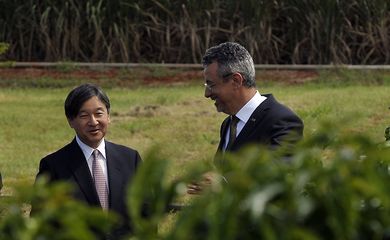Embrapa creates more nutritious and productive tomatoes
The Brazilian Agricultural Research Corporation, Embrapa, is creating a new type of tomatoes, rich in Vitamin A and orangish in color. Embrapa’s orangish tomato is about to be tested for growing, in fields across six different states throughout Brazil.

Tests will aim to monitor fruit development, quality, and productiveness under different conditions until the desired hybrid is attained, which should generate seeds in large scale and be marketed three years from now.
This is not a genetically modified product, but rather an experiment conducted by means of hybrid seeds collected and cataloged in a “genetic library” at Embrapa, with a collection of 1,800 strains of tomato, says Leonardo Boiteux, a scientist at the company’s National Vegetable Research Center.
The new tomato is going the same way as other fruits developed by Embrapa with seeds available for producers or others produced for some time that can be found in supermarkets—like the enriched tomatoes the BRS Zamir and the BRS Nagai.
Free radicals
The BRS Zamir grape-type, cherry-shaped tomato is rich with lycopene—a red substance that facilitates the capture of free radicals, “a sub-product of metabolism that harms our DNA and other cellular structures,” and helps preventing diseases related to “oxidative stress,” Leonardo Boiteux points out concerning some types of cancer, diabetes, rheumatic and neurodegenerative conditions.
The research on BRS Zamir is what made the production of the orangish tomato possible. “If we have such a large amount of lycopene, we can take a step ahead on the metabolic route and produce a tiny little tomato with beta-carotene—the precursor of Vitamin A, to be found in carrots and pumpkins.”
BRZ Zamir was preceded by BRS Nagai, a larger, cylindrical-shaped fruit that can be eaten raw in the salad and used in the production of sauce, as its pulp is more nutritious than that of tomatoes with water in concentration.
The tomatoes developed by Embrapa reach the market by means of a partnership with the private company Agrocinco Comércio de Produtos Agropecuários, based in the municipality of Monte Mor, near Campinas, São Paulo state. Embrapa receives five percent royalties on the funds raised from trade. Under the deal, the company selling the seeds finances part of the research and is in charge of providing access to technology and assistance for producers.
According to official indicators, Brazil is expected to produce 4.5 million tons of tomato this year—up 3.5 percent from last year’s output—in a cultivated area of 66,191 hectares—2.4 percent less than 2017.



